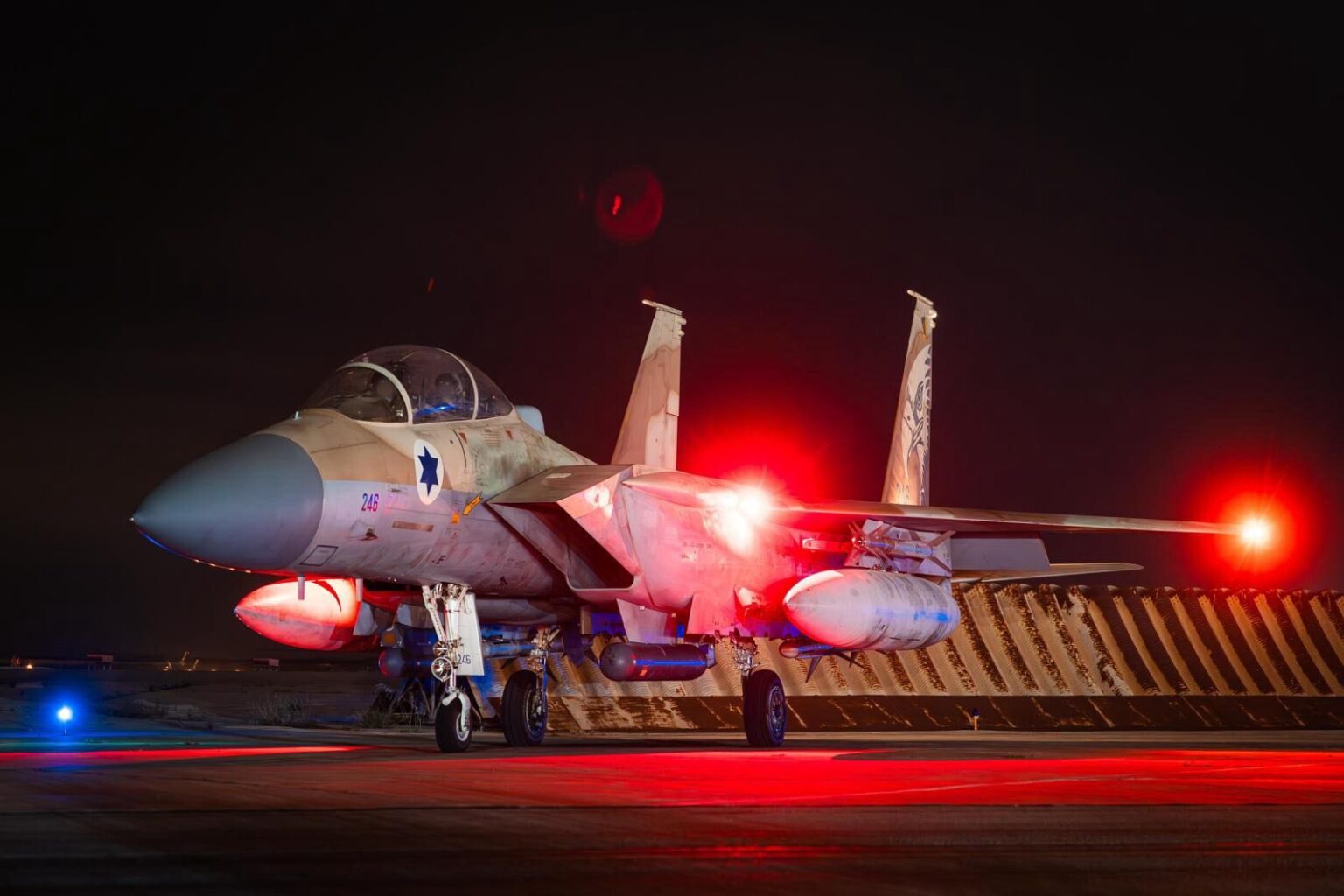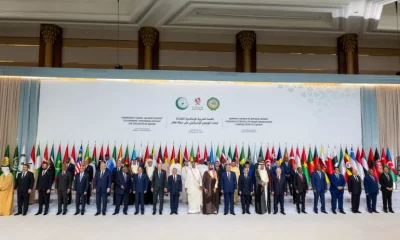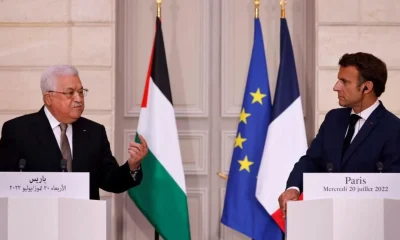News
Why The US Has Suspended The Shipment Of Weapons To Israel
US officials confirmed Wednesday that Washington had suspended a shipment of 2,000-pound bombs to Israel over concerns they would be used in Rafah without a sufficient plan for civilians there. This decision to halt the delivery of what are likely MK-84s – one of the most destructive munitions used by Western armies – comes as Israeli Prime Minister Binyamin Netanyahu doubles down on his determination to launch a lethal ground assault in Rafah despite US warnings.

(France 24)-Is this the end of unconditional US support for Israel? With Netanyahu’s government seemingly ignoring Washington’s warnings of the dire humanitarian consequences of a ground incursion for Rafah’s civilian population, US President Joe Biden on Wednesday threatened to stop deliveringcertain types of munitions to Israel if it pushes into the southern Gaza city, notably the 2,000-pound bombs Israel has been using in its offensive.
“Civilians have been killed in Gaza as a consequence of those bombs and other ways in which they go after population centers,” Biden acknowledged in a one-on-one interview with CNN.
“I made it clear that if they go into Rafah … I’m not supplying the weapons that have been used historically to deal with Rafah, to deal with the cities.”
The US president’s ultimatum came as Netanyahu’s government said it was preparing a “limited” offensive in Rafah despite UN warningsthat a ground assault could lead to a “bloodbath”. Around 1.4 million Palestinians, most of them displaced by Israel’s months-long assault on the besieged enclave, are believed to be crammed into the city.
Biden’s threat has already partly been carried out, US officials have said. Washington last week suspended the delivery of 1,800 of the 2,000-pound bombs, a US official told AP on condition of anonymity, likely MK-84s as well as 1,700 smaller 500-pound bombs.
US Defence Secretary Lloyd Austin told a Senate hearing on Wednesday that an area as densely populated as Rafah demanded less powerful and more precise weapons. The city, which borders Egypt, has an average of 20,000 inhabitants crammed into every square kilometre, according to the UN – the same urban density as the city of Paris.
“We’re going to continue to do what’s necessary to ensure that Israel has the means to defend itself,” Austin said. “But that said, we are currently reviewing some near-term security assistance shipments in the context of unfolding events in Rafah.”
Austin said the US was pausing shipment of “high-payload munitions” over Israeli plans for an incursion into Rafah without an adequate plan for protecting the 1 million civilians who have sought shelter there.
A history of violence
MK-84 bombs have been used by the US militarysince the 1970s, first in Vietnam and then, more sparingly, in Iraq and Afghanistan due to their devastating impact on urban areas. Human Rights Watch has said that these munitions were also used by the Saudi-led coalition in the 2016 bombing of a market in Yemen that killed more than a hundred civilians.
Although these bombs can be modified with the addition of a precision guidance system, this measure would likely do little to avoid civilian deaths in an enclave as densely packed as the Gaza Strip.
Containing 900 pounds of explosives, these 4.5-metre-long bombs leave immense craters in their wake and scatter thousands of potentially lethal fragments in all directions. Nothing within a 350-metre radius can survive.
Military experts say these deadly bombs may have already contributed significantly to the horrific death toll of the war in Gaza. According to the Hamas-run Gaza health ministry, almost 34,000 Palestinians have been killed since war broke out following Hamas’s October 7 attack on Israel that killed almost 1,200 people.
Israel has frequently used these US-supplied bombs in an effort to dislodge Hamas militants from a labyrinthine network of underground tunnels beneath Gaza. According to a New York Times investigation published in December 2023, Israel dropped MK-84 bombs on Gaza every day during the first six weeks of the conflict. On at least 200 occasions, Israeli armed forces have directly targeted areas that were specifically designated as safe for Gazan civilians.
Israel has been criticised for years by human rights NGOs for its widespread use of these gratuitously powerful bombs during previous conflicts in the Gaza Strip.
“These bombs are used to inflict extremely heavy damage, either indiscriminately or completely deliberately, on residential areas or civilian infrastructure, which is forbidden under international law,” Amnesty International France director Jean-Claude Samouiller said. “This has not been respected by Israel, either during this current war in Gaza or in the past.”
‘Be careful’
Israel’s UN Ambassador Gilad Erdan described the US move in an interview with Israel’s Channel 12 as “a very disappointing decision, even frustrating”.
The US is Israel’s leading arms supplier by far. Last month, Congress approved the sale of $14.3 billion in additional arms as part of a larger package that also earmarked military aid for Ukraine and Taiwan. That comes on top of the $3.8 billion in military aid the US sends Israel every year, most of which Israel must use to purchase US military equipment and services.
But this generous support has been called into question since the outbreak of the Israel-Hamas war. Amid outcry from the Muslim community and the progressive left as well as pro-Palestinian protests at major universities, some Democrats are worried about the consequences of the Middle East crisis on the November presidential election.
This decision is the most spectacular sign to date of the mounting disagreements that are poisoning the Biden administration’s relationship with the Netanyahu government, which has brushed off US requests to take greater care to avoid the loss of Palestinian civilian lives.
“It’s an insufficient first step, but it sends a strong signal to Israel,” Samouiller said.
Biden’s announcement also comes amid the ongoing failure of ceasefire talks in Cairo. The latest ceasefire talks collapsed on Thursday with no agreement to halt the fighting or release hostages.
Netanyahu instead maintains he is determined to annihilate Hamas by launching a bloody assault on Rafah, which he maintains is the Palestinian militant group’s last refuge.
Israeli troops seized control of the Rafah border crossing on Tuesday – essential in the supply of humanitarian aid to Gaza – and ordered the evacuation of 100,000 Palestinians. The IDF has also launched what it calls “targeted strikes” in the city’s east.
Washington’s decision is “some kind of diplomatic message to Mr Netanyahu that he needs to take into consideration American interests more than he has over the last few months”, former deputy head of Israel’s National Security Council Itamar Yaar told the Associated Press. Yaar added that while the decision would not have an immediate impact on Israel’s military capacities, he stressed that it was “a kind of a signal, a ‘Be careful’”.
Kenya Insights allows guest blogging, if you want to be published on Kenya’s most authoritative and accurate blog, have an expose, news TIPS, story angles, human interest stories, drop us an email on [email protected] or via Telegram
-

 News5 days ago
News5 days agoTemporary Reprieve As Mohamed Jaffer Wins Mombasa Land Compensation Despite Losing LPG Monopoly and Bitter Fallout With Johos
-

 Sports4 days ago
Sports4 days ago1Win Games 2025: Ultimate Overview of Popular Casino, Sports & Live Games
-

 Business2 weeks ago
Business2 weeks agoPanic As Payless Africa Freezes With Billions of Customers Cash After Costly Jambopay Blunder
-

 Investigations5 days ago
Investigations5 days agoFrom Daily Bribes to Billions Frozen: The Jambopay Empire Crumbles as CEO Danson Muchemi’s Scandal-Plagued Past Catches Up
-

 Business5 days ago
Business5 days agoHass Petroleum Empire Faces Collapse as Court Greenlights KSh 1.2 Billion Property Auction
-

 Investigations1 week ago
Investigations1 week agoHow SportPesa Outfoxed Paul Ndung’u Of His Stakes With A Wrong Address Letter
-

 Business1 day ago
Business1 day agoEABL Under Probe Over Controversial Sh16.8 Billion Bond Raised Before Disclosing Change in Control
-

 News5 days ago
News5 days agoShanta Gold’s Sh680 Billion Gold Discovery in Kakamega Becomes A Nightmare For Community With Deaths, Investors Scare































